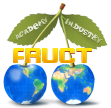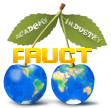|
The Transport and Telecommunication Institute (TSI) is the only one of private universities of our country that was included in the list of the 15 scientific institutions of international importance which operate in Latvia.
.jpg)
International evaluation of 150 research bodies – scientific
institutions, universities and units thereof, private institutions, commercial unions, establishments – was carried out. The experts concluded that there are 15 (i.e. 10% of the total number) powerful scientific institutes and university units of international importance operating in Latvia, of which one is the Transport and Telecommunication Institute. All the institutions were evaluated on a 5-grade scale. The Latvian Institute of Organic Synthesis was the only one to receive 5 points. The other “top 15” participants (see the list below) were awarded 4 points,
which, according to the authors of the study, means: “a
powerful international player” (good performance, activity to be continued).
Irina Yatskiv, Acting Rector of the Transport and
Telecommunication Institute, explains that the TSI was assessed as a scientific
organisation which carries out research in the fields of engineering and computer
sciences.“We are very glad to have received this assessment, as we think that engineering sciences and technical education are the fields that need to be paid special attention to in Latvia: their development is to be promoted by the government, and they should be looked at closer by the public. I think that the current crisis in science and education in our country was caused by
disproportion between the various sectors of science, the over-enthusiasm for the so-called “light sectors””, says Irina Yatskiv.
The TSI is a private institute, and as such, it receives no financing
from the national budget. Still, the Institute invests in the scientific
activity: it uses both own resources and EU funds' support. Acting Rector of the TSI says that the education process should be closely linked with science,
on the one hand, and best examples and practices in the respective sector, on
the other hand. Therefore, the TSI both carries out research and
facilitates cooperation with companies from the sectors for which it prepares
specialists. All this allows maintaining education at a high level
of quality.
It should be noted that a range of public and private academic
institutions were awarded a low grade and even received recommendations from
international experts, namely, that part of them should be wound-up and the
other part should be integrated with more powerful research organisations. Representatives
of several educational establishments have already expressed criticism as
regards the study methodology. The ex-minister of education and science,
Roberts Ķīlis, during whose mandate the study was launched, argues that the
methodology has been verified among several tens of countries and that
assessments are carried out by serious, internationally recognised experts.
The international evaluation of the activity of the
Latvian scientific institutions was carried out by the Ministry of Education
and Science in cooperation with the Secretariat of the Nordic Council of
Ministers. The purpose of the evaluation was to carry out an objective analysis of
the situation of the Latvian science in the context of the common research area
of the European Union and research cooperation according to the interests of
the countries of the Baltic Sea region and Nordic countries.
The overall conclusion is that the level
of quality, management and infrastructure of the Latvian research is not
satisfactory. However, there are individual high-level institutions in Latvia,
including the TSI, which can serve as centres for consolidation and future
investments. In the expert opinion, acute lack of finance is the main
problem of the Latvian science. The experts indicate that if no
substantial investments are made in research and higher education, it will not
be possible to establish and maintain contemporary economics.
After the conclusion of the study the
expert group provided several recommendations. Clearly,
first, it is necessary to ensure sound public financing to research and to use
structural funds for structural reforms in science and transition to a higher
level of performance. Next, it is necessary to integrate
and strengthen the research system by consolidating research institutions
mainly around knowledge centres (institutions having received 4 and
5 points).
The opinion on the overall evaluation was made by the
expert group by consensus, by awarding grades to the institutions as follows:
5 – “a powerful international player, leader in its
field” (excellent performance, activity to be continued),
4 – “a powerful international player” (good
performance, activity to be continued),
3 – “a powerful local player who has gained certain
international appreciation” (the institution’s capacity is to be reviewed and
strengthened),
2 – “a satisfactory local player” (integration with other institutions
to be considered),
1 – “a poor local player” (activity to be discontinued).
Interestingly, this is the second time that international evaluation of
science is carried out in Latvia since the regaining if its independence. The first one took place in 1992 when not only the Latvian science but
also the whole national economy experienced drastic structural changes. Therefore, the present evaluation is, in a way, equally important for
researchers, policy makers and the Latvian science system in general. The Ministry of Education and Science informs that the next
international evaluation of science is to be carried out in 5 years, in
2019.
More information about the results of the evaluation can be found on the
Ministry's website (in Latvian): http://izm.izm.gov.lv/aktualitates/informacija-medijiem/10655.html
http://www.youtube.com/watch?v=8f-_KtxnUSs
15 scientific institutions and
university structural units having received the highest evaluation
|
Scientific institution
|
Overall evaluation
|
|
Institute of Atomic Physics and Spectroscopy
of the University of Latvia
|
4
|
|
Institute of Solid State Physics of the
University of Latvia
|
4
|
|
Institute of Literature, Folklore and
Art of the University of Latvia
|
4
|
|
Faculty of Computing of the University
of Latvia
|
4
|
|
Faculty of Geography and Earth Sciences
of the University of Latvia
|
4
|
|
Department of Physics, Department of
Optometry and Vision Science of the University of Latvia
|
4
|
|
G.Libert's Innovative Microscopy Centre
of Daugavpils University, Physics Department, Mathematics Research Centre
|
4
|
|
Institute of Electronics and Computer
Science
|
4
|
|
Latvian State Institute of Wood
Chemistry
|
4
|
|
Engineering Research Institute
“Ventspils International Radio Astronomy Centre” of Ventspils University
College
|
4
|
|
Transport
and Telecommunication Institute
|
4
|
|
Biomedical Research and Study Centre of the
University of Latvia
|
4
|
|
P. Stradiņš Clinical University Hospital
|
4
|
|
Institute of Food Safety, Animal Health
and Environment “BIOR”
|
4
|
|
Latvian Institute of Organic Synthesis
|
5
|
Source: Ministry
of Education and Science of the Republic of Latvia
|






















.jpg)

